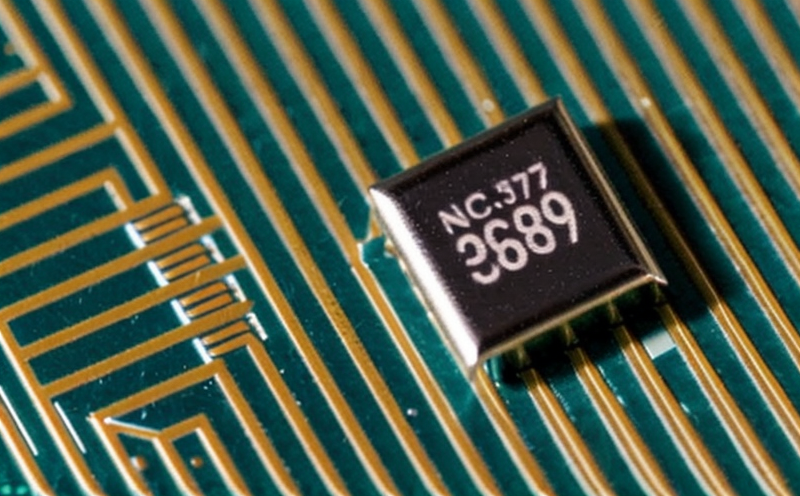JEDEC JESD22-A104 Temperature Cycling Lifetime Testing
The JEDEC JESD22-A104 test is a critical procedure designed to evaluate the reliability and endurance of semiconductor devices, particularly microchips. This testing standard simulates the operational conditions that a device might encounter over its lifetime, ensuring it remains functional under extreme environmental stresses.
During this test, samples are subjected to rapid temperature cycling between very low temperatures (as low as -40°C) and high temperatures (up to 150°C). The goal is to accelerate the natural aging process of the device so that potential failures can be identified early in development. This allows manufacturers to identify and rectify issues before products reach end-users, thus enhancing product quality and reliability.
The test procedure involves precise temperature control and monitoring, ensuring that each cycle is executed with high accuracy. The duration of these cycles can vary depending on the specific application and required testing parameters but typically spans several days or weeks. During this time, engineers closely observe changes in the device’s performance to identify any signs of degradation.
For optimal results, specimen preparation plays a crucial role. This includes ensuring that all parts of the microchip are correctly aligned and connected before undergoing the temperature cycling process. The testing apparatus used for JESD22-A104 is sophisticated and capable of maintaining extremely stable temperatures across wide ranges. Instruments such as programmable environmental chambers or ovens are employed to ensure consistent conditions.
The acceptance criteria for passing this test vary based on the specific type of semiconductor being tested. Typically, a device passes if it maintains its specified electrical performance parameters throughout all cycles without any failure points or significant changes in resistance or capacitance. Additionally, visual inspections may be conducted to check for physical damage such as cracks or delamination.
Given the complexity and importance of this test, accurate and detailed reporting is essential. Reports generated from JESD22-A104 testing detail not only whether a device has passed but also provide insights into any observed issues during testing. These reports are vital for quality assurance departments to make informed decisions about product design improvements.
Understanding the broader context, the semiconductor and microchip industry relies heavily on such rigorous testing protocols like JESD22-A104 to ensure that products meet stringent safety standards set by international bodies. By adhering to these guidelines, manufacturers can build trust with customers while complying with regulatory requirements.
- Environmental stressors: Extreme temperatures are simulated to mimic real-world conditions experienced throughout the product lifecycle.
- Longevity assessment: The test helps determine how long a device will perform reliably under adverse environmental conditions.
The goal of this testing is not only to ensure immediate operational efficiency but also to predict future performance and longevity. This predictive capability allows manufacturers to design better products that last longer, reducing warranty costs and enhancing customer satisfaction.
Eurolab Advantages
At Eurolab, we pride ourselves on offering comprehensive semiconductor testing services tailored to meet the needs of various industries. Our expertise in JESD22-A104 ensures that our clients receive accurate and reliable results every time.
- State-of-the-art facilities: We utilize cutting-edge equipment capable of providing precise temperature control, ensuring consistent and repeatable test conditions.
- Experienced professionals: Our team consists of highly trained engineers who possess in-depth knowledge of semiconductor testing standards including JESD22-A104.
- Comprehensive reporting: We provide detailed reports that not only confirm compliance with the standard but also offer valuable insights into potential areas for improvement.
Our commitment to quality and customer satisfaction sets us apart from other laboratories. By leveraging our advanced technology and skilled personnel, we ensure that your products undergo thorough evaluation, leading to enhanced reliability and durability.
Environmental and Sustainability Contributions
- Eco-friendly operations: Our laboratory follows sustainable practices in all aspects of its operation. This includes energy-efficient equipment and waste reduction strategies which contribute positively towards environmental conservation efforts.
- Resource optimization: By optimizing resource use during testing processes, we minimize the overall impact on natural resources while still delivering high-quality results.
The rigorous nature of our testing methods helps in reducing defects and rework rates, thereby decreasing waste generation at production stages. Additionally, by ensuring compliance with international standards like JESD22-A104, we contribute towards maintaining global environmental regulations that promote sustainable development goals.
Competitive Advantage and Market Impact
- Enhanced product quality: By incorporating rigorous testing procedures into our clients' production processes early on, we help improve overall product quality which can lead to increased market share.
- Innovation facilitation: Our services encourage continuous improvement in design and manufacturing techniques by identifying weak points through extensive testing.
The ability to meet stringent international standards positions our clients favorably within competitive markets. It enhances their reputation among consumers who value reliability and durability when making purchasing decisions. Furthermore, successful completion of these tests can open doors for new markets or expand existing ones.





